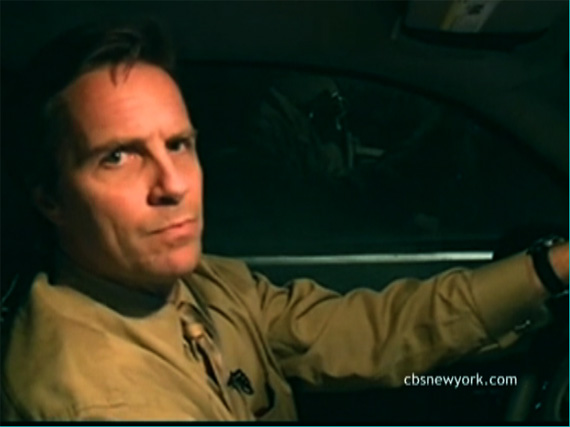The local news promo you're watching was broadcast on CBS2 last week to tout their "amazing new technology" -- Mobile2. What is Mobile2? According to the promo, it's "a fleet of units covering the entire Tri-State area" so that viewers at home can literally get the windshield perspective on what's going on outside.
Basically, CBS2 correspondents are reporting while driving -- filing entire segments with their hands on the wheel, their feet poised near the pedals, and their gaze shifting back and forth between the road and the camera.
So the same news producers who brought you "Bike Bedlam" and gave Marty Markowitz a megaphone to tear into pedestrian and bicycle safety improvements are beaming a big "Who Cares?" about distracted driving into hundreds of thousands of living rooms on a nightly basis. Given everything that we know about the dangers of driver inattention, "Mobile2" is an incredibly reckless gimmick that should be discontinued immediately.
In case the team at CBS2 missed it, distracted driving is big news. A few developments from the past couple of years:
- The Secretary of Transportation, Ray LaHood, has said that he's "on a rampage" against distracted driving and has made it one of his signature issues. The U.S. DOT estimates that more than 5,000 Americans die in crashes caused by distracted driving each year, and the agency has put on two major conferences to combat driver distraction.
- The New York Times has run a long multi-part series about the risks of distracted driving.
- Driver inattention is the number one cause of pedestrian fatalities and serious injuries in New York City, according to NYC DOT's Pedestrian Safety Study.
- Oprah has zero tolerance for distracted driving.
The CBS2 reporters in Mobile2 are engaged in two distinct cognitive tasks: Driving a car, and communicating information to viewers clearly and professionally. They've even conducted interviews while driving, like in this segment with reporter Lou Young and former Mets manager Bobby Valentine.
The research on multi-tasking is clear. The human mind can't do two things at once. Performing more than one cognitive task simultaneously actually requires your brain to switch back and forth between tasks, degrading your performance in both. This "cognitive distraction" explains why researchers have not observed any reduction in danger from using hands-free cell phones compared to conventional handsets. As the National Safety Council explained in this 2010 white paper [PDF], it's the act of talking on the phone that degrades drivers' ability to process visual information and slows their reaction times.
Even if Tony Aiello, Lou Young, and company never took their eyes off the road while filing these segments, reporting while driving is dangerous and sends all the wrong messages to CBS2 viewers about how to drive safely. It has to stop.






